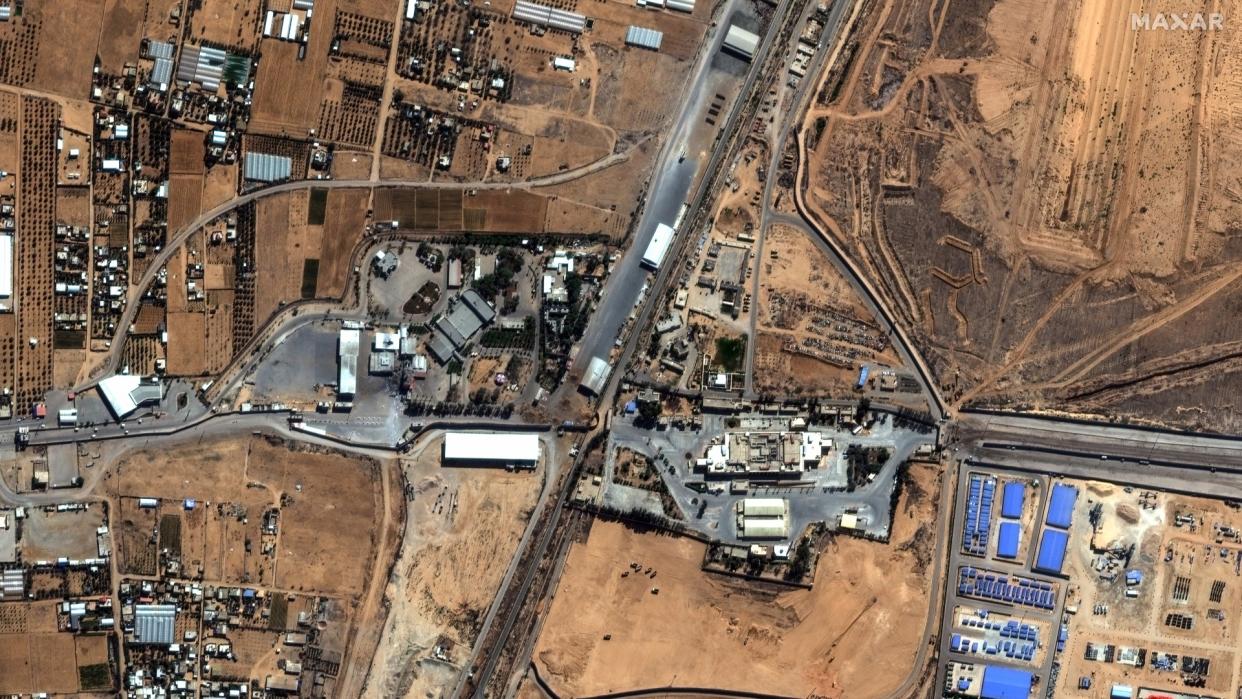Rafah border crossing: will Egypt open lifeline to Gaza?

Thousands of people desperate to escape from Gaza are heading to the Rafah border crossing with Egypt amid frantic diplomatic efforts to reopen the only route out of the besieged territory.
All routes in and out of the Gaza Strip are currently closed as Israel steps up its air strikes and prepares to send in ground troops in response to last week's unprecedented attack by Hamas that has left more than 1,400 Israelis dead and seen 199 taken hostage.
Israel has cut off the supply of food, water and fuel as part of its "complete siege" of the territory and called on over 1 million civilians living in and around Gaza City to head south ahead of an imminent invasion by Israeli Defense Forces (IDF).
With an estimated 2.3 million people "kettled inside a space that is more densely populated than London" and the Israeli government vowing to destroy Hamas by any means possible, "something terrible is about to unfold", said The Economist. "The only realistic path to protecting the innocent lies in hard-headed negotiations, and nowhere more so than over plans to open up the crossing between Gaza and Egypt".
What did the papers say?
The Rafah crossing, located on the southern edge of Gaza, is the only way into Egypt and "serves as a vital link between Gaza and the rest of the world", reported Al Jazeera.
The Egyptian government has told the international community to direct aid flights to el-Arish, which is about 45 miles from Rafah, with hundreds of tonnes of supplies seen waiting on trucks ready to cross the border. But while Egypt now appears to be prepared to reopen the crossing to allow foreign nationals out and humanitarian assistance in, the BBC said the country "fears a massive influx of Palestinian refugees fleeing the war".
Both Egypt and other Arab states say this would be unacceptable because it would amount to the expulsion of Palestinians from their homeland. Sameh Shoukry, Egypt’s foreign minister, warned that “forced displacement” was no solution to the Palestinian crisis, said the Financial Times (FT).
Egypt already has around 9 million migrants from Sudan, Syria, Yemen, Libya and elsewhere, and "on top of that is facing an economic crisis", said Al Jazeera. This means Cairo is "reluctant" to simply open its border to hundreds of thousands more refugees because of "national security considerations".
Given Hamas's links to the Muslim Brotherhood, the domestic branch of which has been banned in Egypt as a terrorist organisation, Cairo has "long-standing security and political concerns about Palestinians entering the country from the Rafah border crossing", said The New Humanitarian.
Cairo's "main fear" said the FT, is that the longer Israel's offensive on Gaza continues "the more Egypt will face pressure to accept a flood of refugees into Sinai, a sparsely populated and arid peninsula with a history of instability".
An exodus of Palestinians into northern Sinai would represent a "nightmare scenario" that would "unleash disruptive pressures it wants to avoid", said the FT. While the sudden influx of refugees could have an immediately destabilising effect, permanent camps on the border "could breed Islamist terrorism that aggravate instability in the Sinai, or blow back into the rest of the country", said The Economist.
"If, years from now, camps become bases for attacking Israel, they might even poison relations between Egypt and Israel, a cornerstone of Middle East security," the newspaper added.
What next?
The problem is that while Egypt is willing to allow humanitarian aid into Gaza, it appears completely opposed to letting the majority of Gazans leave. Israel, meanwhile, is pushing for exactly the opposite.
This has prompted a flurry of diplomatic back-channelling aimed at reopening the crossing, at least to allow humanitarian aid in.
This effort has been led by US Secretary of State Antony Blinken, who arrived back in Israel on Monday after a whistle-stop tour of six Arab states in the region. Blinken and UK Foreign Secretary James Cleverly said they were working with Israel, Egypt and "other leading political voices in the region" to reopen the crossing.
As of Monday evening, however, the BBC reported there had been "no progress" in negotiations.
To break the impasse, The Economist suggested Israel, America, Egypt and "well-meaning Arab states" should make a "formal guarantee, underwritten by the United States, that the flight into the Sinai would be temporary.
"Egypt, which is in economic difficulties, may be more amenable if Arab states were to offer it relief on its debts. America could grease the wheels."

